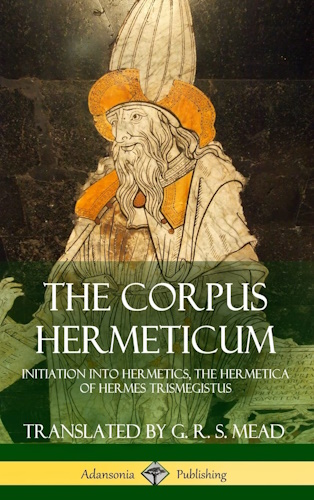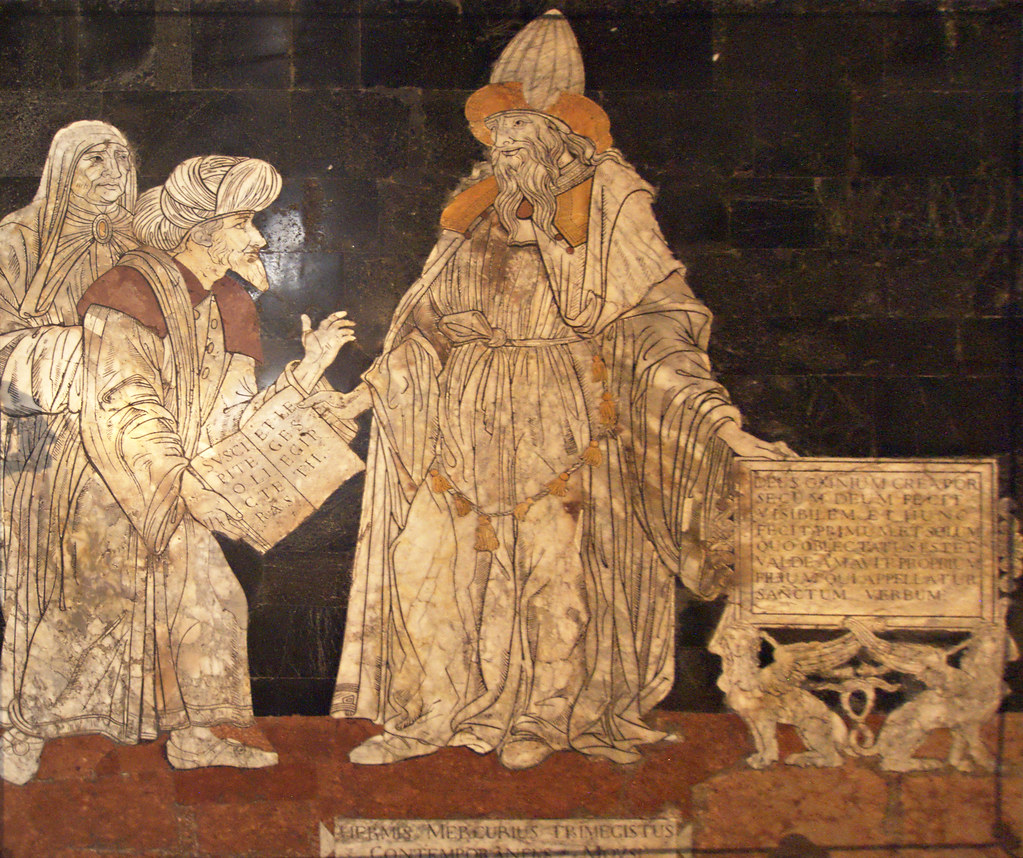
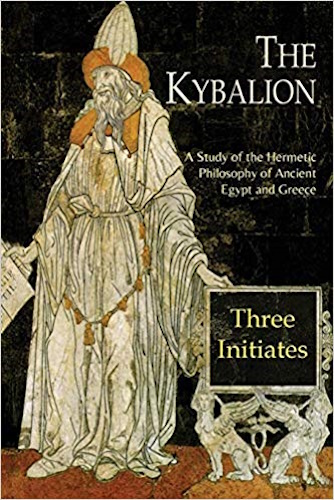

![Thrice-Greatest Hermes; Studies in Hellenistic Theosophy and Gnosis [Three Volumes in One] Thrice-Greatest Hermes; Studies in Hellenistic Theosophy and Gnosis [Three Volumes in One]](http://realityroars.com/images/affiliate-creative/thrice-greatest-hermes--studies-in-hellenistic-theosophy-and-gnosis.jpg)

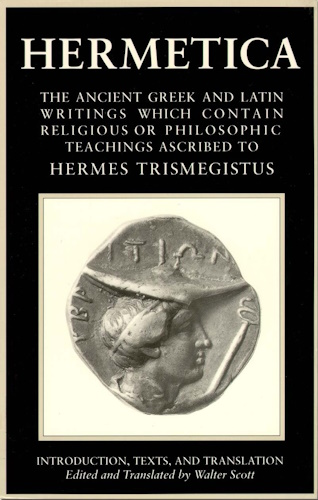



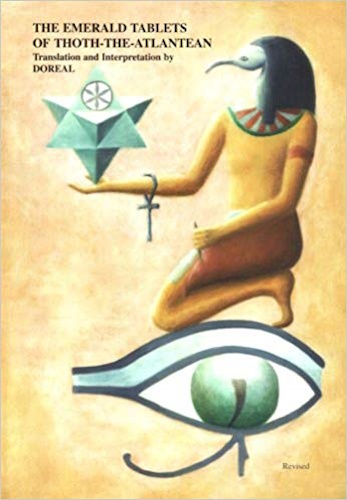

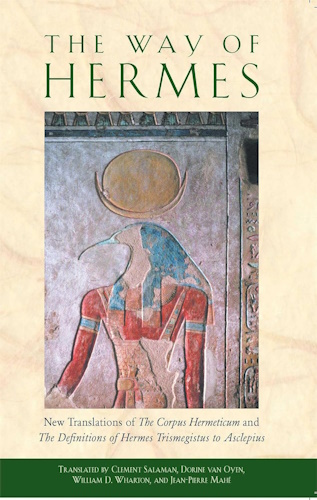

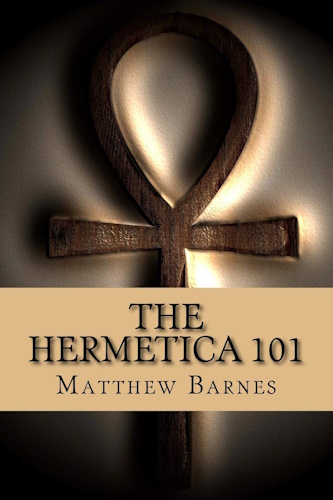

![]()
![]()
IV. The Cup or Monad
<This short text gives an unusually lucid overview of the foundations of Hermetic thought. The stress on rejection of the body and its pleasures, and on the division of humanity into those with Mind and those without, are reminiscent of some of the so-called "Gnostic" writings of the same period. The idea that the division is a matter of choice, on the other hand, is a pleasant variation on the almost Calvinist flavor of writings such as the Apocalypse of Adam.
Mead speculates that the imagery of the Cup in this text may have a distant connection, by way of unorthodox ideas about Communion, with the legends of the Holy Grail. - JMG>
1. Hermes: With Reason (Logos), not with hands, did the World-maker make the universal World; so that thou shouldst think of him as everywhere and ever-being, the Author of all things, and One and Only, who by His Will all beings hath created.
This Body of Him is a thing no man can touch, or see, or measure, a body inextensible, like to no other frame. 'Tis neither Fire nor Water, Air nor Breath; yet all of them come from it. Now being Good he willed to consecrate this [Body] to Himself alone, and set its Earth in order and adorn it.
2. So down [to Earth] He sent the Cosmos of this Frame Divine - man, a life that cannot die, and yet a life that dies. And o'er [all other] lives and over Cosmos [too], did man excel by reason of the Reason (Logos) and the Mind. For contemplator of God's works did man become; he marvelled and did strive to know their Author.
3. Reason (Logos) indeed, O Tat, among all men hath He distributed, but Mind not yet; not that He grudgeth any, for grudging cometh not from Him, but hath its place below, within the souls of men who have no Mind.
Tat: Why then did God, O father, not on all bestow a share of Mind?
H: He willed, my son, to have it set up in the midst for souls, just as it were a prize.
4. T: And where hath He set it up?
H: He filled a mighty Cup with it, and sent it down, joining a Herald [to it], to whom He gave command to make this proclamation to the hearts of men:
Baptize thyself with this Cup's baptism, what heart can do so, thou that hast faith thou canst ascend to him that hath sent down the Cup, thou that dost know for what thoudidst come into being!
As many then as understood the Herald's tidings and doused themselves in Mind, became partakers in the Gnosis; and when they had "received the Mind" they were made "perfect men".
But they who do not understand the tidings, these, since they possess the aid of Reason [only] and not Mind, are ignorant wherefor they have come into being and whereby.
5. The senses of such men are like irrational creatures'; and as their [whole] make-up is in their feelings and their impulses, they fail in all appreciation of <lit.: "they do not wonder at"> those things which really are worth contemplation. These center all their thought upon the pleasures of the body and its appetites, in the belief that for its sake man hath come into being.
But they who have received some portion of God's gift, these, Tat, if we judge by their deeds, have from Death's bonds won their release; for they embrace in their own Mind all things, things on the earth, things in the heaven, and things above the heaven - if there be aught. And having raised themselves so far they sight the Good; and having sighted it, they look upon their sojourn here as a mischance; and in disdain of all, both things in body and the bodiless, they speed their way unto that One and Only One.
6. This is, O Tat, the Gnosis of the Mind, Vision of things Divine; God-knowledge is it, for the Cup is God's.
T: Father, I, too, would be baptized.
H: Unless thou first shall hate thy Body, son, thou canst not love thy Self. But if thou lov'st thy Self thou shalt have Mind, and having Mind thou shalt share in the Gnosis.
T: Father, what dost thou mean?
H: It is not possible, my son, to give thyself to both - I mean to things that perish and to things divine. For seeing that existing things are twain, Body and Bodiless, in which the perishing and the divine are understood, the man who hath the will to choose is left the choice of one or the other; for it can never be the twain should meet. And in those souls to whom the choice is left, the waning of the one causes the other's growth to show itself.
7. Now the choosing of the Better not only proves a lot most fair for him who makes the choice, seeing it makes the man a God, but also shows his piety to God. Whereas the [choosing] of the Worse, although it doth destroy the "man", it doth only disturb God's harmony to this extent, that as processions pass by in the middle of the way, without being able to do anything but take the road from others, so do such men move in procession through the world led by their bodies' pleasures.
8. This being so, O Tat, what comes from God hath been and will be ours; but that which is dependent on ourselves, let this press onward and have no delay, for 'tis not God, 'tis we who are the cause of evil things, preferring them to good.
Thou see'st, son, how many are the bodies through which we have to pass, how many are the choirs of daimones, how vast the system of the star-courses [through which our Path doth lie], to hasten to the One and Only God.
For to the Good there is no other shore; It hath no bounds; It is without an end; and for Itself It is without beginning, too, though unto us it seemeth to have one - the Gnosis.
9. Therefore to It Gnosis is no beginning; rather is it [that Gnosis doth afford] to us the first beginning of its being known.
Let us lay hold, therefore, of the beginning. and quickly speed through all [we have to pass].
`Tis very hard, to leave the things we have grown used to, which meet our gaze on every side, and turn ourselves back to the Old Old [Path].
Appearances delight us, whereas things which appear not make their believing hard.
Now evils are the more apparent things, whereas the Good can never show Itself unto the eyes, for It hath neither form nor figure.
Therefore the Good is like Itself alone, and unlike all things else; or `tis impossible that That which hath no body should make Itself apparent to a body.
10. The "Like's" superiority to the "Unlike" and the "Unlike's" inferiority unto the "Like" consists in this:
The Oneness being Source and Root of all, is in all things as Root and Source. Without [this] Source is naught; whereas the Source [Itself] is from naught but itself, since it is Source of all the rest. It is Itself Its Source, since It may have no other Source.
The Oneness then being Source, containeth every number, but is contained by none; engendereth every number, but is engendered by no other one.
11. Now all that is engendered is imperfect, it is divisible, to increase subject and to decrease; but with the Perfect [One] none of these things doth hold. Now that which is increasable increases from the Oneness, but succumbs through its own feebleness when it no longer can contain the One.
And now, O Tat, God's Image hath been sketched for thee, as far as it can be; and if thou wilt attentively dwell on it and observe it with thine heart's eyes, believe me, son, thou'lt find the Path that leads above; nay, that Image shall become thy Guide itself, because the Sight [Divine] hath this peculiar [charm], it holdeth fast and draweth unto it those who succeed in opening their eyes, just as, they say, the magnet [draweth] iron.


![Thrice-Greatest Hermes; Studies in Hellenistic Theosophy and Gnosis [Three Volumes in One] Thrice-Greatest Hermes; Studies in Hellenistic Theosophy and Gnosis [Three Volumes in One]](http://realityroars.com/images/affiliate-creative/thrice-greatest-hermes--studies-in-hellenistic-theosophy-and-gnosis.jpg)











-
Urantia Book, 44:0.11 - The Celestial Artisans
Never in your long ascendancy will you lose the power to recognize your associates of former existences. Always, as you ascend inward in the scale of life, will you retain the ability to recognize and fraternize with the fellow beings of your previous and lower levels of experience. Each new translation or resurrection will add one more group of spirit beings to your vision range without in the least depriving you of the ability to recognize your friends and fellows of former estates.
-
Princess Bride 1987 Wallace Shawn (Vizzini) and Mandy Patinkin (Inigo Montoya)
Vizzini: HE DIDN'T FALL? INCONCEIVABLE.
Inigo Montoya: You keep using that word. I do not think it means what you think it means. -
Urantia Book, 117:4.14 - The Finite God
And here is mystery: The more closely man approaches God through love, the greater the reality -- actuality -- of that man. The more man withdraws from God, the more nearly he approaches nonreality -- cessation of existence. When man consecrates his will to the doing of the Father's will, when man gives God all that he has, then does God make that man more than he is.
-
Urantia Book, 167:7.4 - The Talk About Angels
"And do you not remember that I said to you once before that, if you had your spiritual eyes anointed, you would then see the heavens opened and behold the angels of God ascending and descending? It is by the ministry of the angels that one world may be kept in touch with other worlds, for have I not repeatedly told you that I have other sheep not of this fold?"
-
Urantia Book, Foreword - 0:12.12 - The Trinities
But we know that there dwells within the human mind a fragment of God, and that there sojourns with the human soul the Spirit of Truth; and we further know that these spirit forces conspire to enable material man to grasp the reality of spiritual values and to comprehend the philosophy of universe meanings. But even more certainly we know that these spirits of the Divine Presence are able to assist man in the spiritual appropriation of all truth contributory to the enhancement of the ever-progressing reality of personal religious experience—God-consciousness.
-
Urantia Book, 1:4.3 - The Mystery Of God
When you are through down here, when your course has been run in temporary form on earth, when your trial trip in the flesh is finished, when the dust that composes the mortal tabernacle "returns to the earth whence it came"; then, it is revealed, the indwelling "Spirit shall return to God who gave it." There sojourns within each moral being of this planet a fragment of God, a part and parcel of divinity. It is not yet yours by right of possession, but it is designedly intended to be one with you if you survive the mortal existence.
-
Urantia Book, 1:4.1 - The Mystery Of God
And the greatest of all the unfathomable mysteries of God is the phenomenon of the divine indwelling of mortal minds. The manner in which the Universal Father sojourns with the creatures of time is the most profound of all universe mysteries; the divine presence in the mind of man is the mystery of mysteries.
-
Urantia Book, 1:4.6 - The Mystery Of God
To every spirit being and to every mortal creature in every sphere and on every world of the universe of universes, the Universal Father reveals all of his gracious and divine self that can be discerned or comprehended by such spirit beings and by such mortal creatures. God is no respecter of persons, either spiritual or material. The divine presence which any child of the universe enjoys at any given moment is limited only by the capacity of such a creature to receive and to discern the spirit actualities of the supermaterial world.
-
Urantia Book, 11:0.1 - The Eternal Isle Of Paradise
Paradise is the eternal center of the universe of universes and the abiding place of the Universal Father, the Eternal Son, the Infinite Spirit, and their divine co-ordinates and associates. This central Isle is the most gigantic organized body of cosmic reality in all the master universe. Paradise is a material sphere as well as a spiritual abode. All of the intelligent creation of the Universal Father is domiciled on material abodes; hence must the absolute controlling center also be material, literal. And again it should be reiterated that spirit things and spiritual beings are real.
-
Urantia Book, 50:6.4 - Planetary Culture
Culture presupposes quality of mind; culture cannot be enhanced unless mind is elevated. Superior intellect will seek a noble culture and find some way to attain such a goal. Inferior minds will spurn the highest culture even when presented to them ready-made.
-
Urantia Book, 54:1.6 - True And False Liberty
True liberty is the associate of genuine self-respect; false liberty is the consort of self-admiration. True liberty is the fruit of self-control; false liberty, the assumption of self-assertion. Self-control leads to altruistic service; self-admiration tends towards the exploitation of others for the selfish aggrandizement of such a mistaken individual as is willing to sacrifice righteous attainment for the sake of possessing unjust power over his fellow beings.
-
Urantia Book, 54:1.9 - True And False Liberty
How dare the self-willed creature encroach upon the rights of his fellows in the name of personal liberty when the Supreme Rulers of the universe stand back in merciful respect for these prerogatives of will and potentials of personality! No being, in the exercise of his supposed personal liberty, has a right to deprive any other being of those privileges of existence conferred by the Creators and duly respected by all their loyal associates, subordinates, and subjects.
-
Urantia Book, 54:1.8 - True And False Liberty
There is no error greater than that species of self-deception which leads intelligent beings to crave the exercise of power over other beings for the purpose of depriving these persons of their natural liberties. The golden rule of human fairness cries out against all such fraud, unfairness, selfishness, and unrighteousness.

